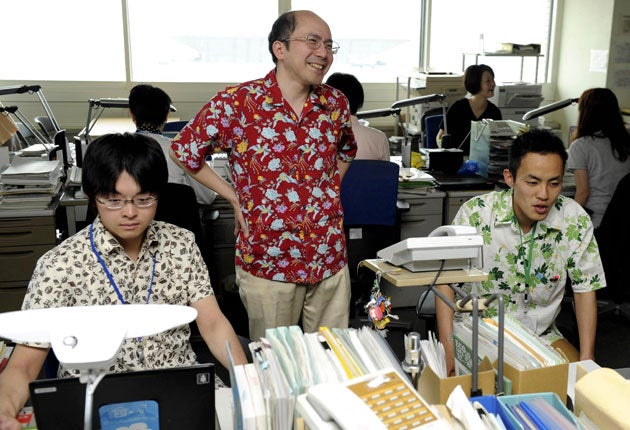Japan workers ditch their suits to save power

In a country synonymous with the buttoned-down corporate army that keeps its huge economy humming, getting Japan to ditch its suits is an uphill task. A summer power crunch in Tokyo exacerbated by the crisis at the Fukushima nuclear plant, however, is forcing the government to ask the impossible.
The salary-man uniform of tie, dark jacket and leather shoes is out. Chinos, loose Hawaiian shirts and sandals are in. Government office workers can wear T-shirts ("solid colours"), jeans ("no rips or holes"), even peddle-pushers – anything that keeps power-guzzling air-conditioners switched off.
And in a further move to conserve energy, some government employees yesterday came to work an hour early, so that, in theory, they can leave the office before they have to turn the lights on. "It should be a good thing, and it doesn't require any cost," Tokyo's Governor Shintaro Ishihara said. "I think all of Japan should shift to summer-time hours."
Japan's environment ministry has kicked off the so-called "Super Cool Biz" campaign in earnest in Tokyo. The world's most-populated metropolis is being asked to slash electricity use by 15 per cent, the prelude to an eco-revolution, promises the Environment Minister, Ryu Matsumoto.
"This will not just be a temporary event this summer. It is going to change the way of life in Japan," he said.
The capital is supplied mostly by Tokyo Electric Power Co (Tepco), which operates the Fukushima Daiichi nuclear plant, which was crippled by the 11 March earthquake and tsunami, slashing the energy supply to the city.
Across Tokyo, Mr Matsumoto's revolution is already in progress. Lifts in department stores and railway stations have been switched off. Lights are dimmed in thousands of convenience stores. Colleges have brought holidays forward by a month to save power on air-conditioning in August. The University of Tokyo, among the city's top-10 energy users, says it has shaved a huge 350,000 kilowatts of electricity off its daily bill.
Campaigners have targeted Japan's five million-plus vending machines, which they say need the equivalent of at least a single nuclear reactor to keep them running. Governor Ishihara has waded into the fight, singling out the country's 12,500 pachinko pinball gaming parlours for special attention. "It's crazy that pachinko wastes so much electricity," said Mr Ishihara, before issuing a typically blustering government threat to unplug them.
But it is air-conditioning which gets the authorities hottest under the collar. During the summer, daily temperatures in the city can hover above 30C for weeks on end, sending cases of heat stroke soaring. A government directive has set workplace temperatures at a muggy but not unbearable 28C and recommends that millions of workers leave the suits in the wardrobe and dress appropriately. At least that is the plan.
Getting that message across to the country's conservative business community is proving a struggle, however. Most companies have told employees to shed the jacket and tie, but not get carried away. "We've been told to stay close to the suit look," says Yukimoto Tetsushi, who works for Toshiba. "No shorts, mini-skirts, or bare-shouldered tops; leather shoes, no sandals. Anything else would be rude to our customers and embarrass the company."
And the earlier start to the working day is not to everyone's taste, either. "Just another plot to get us up earlier in the morning," grumbled one worker to Fuji TV. "Nothing changes."
Join our commenting forum
Join thought-provoking conversations, follow other Independent readers and see their replies
Comments
Bookmark popover
Removed from bookmarks